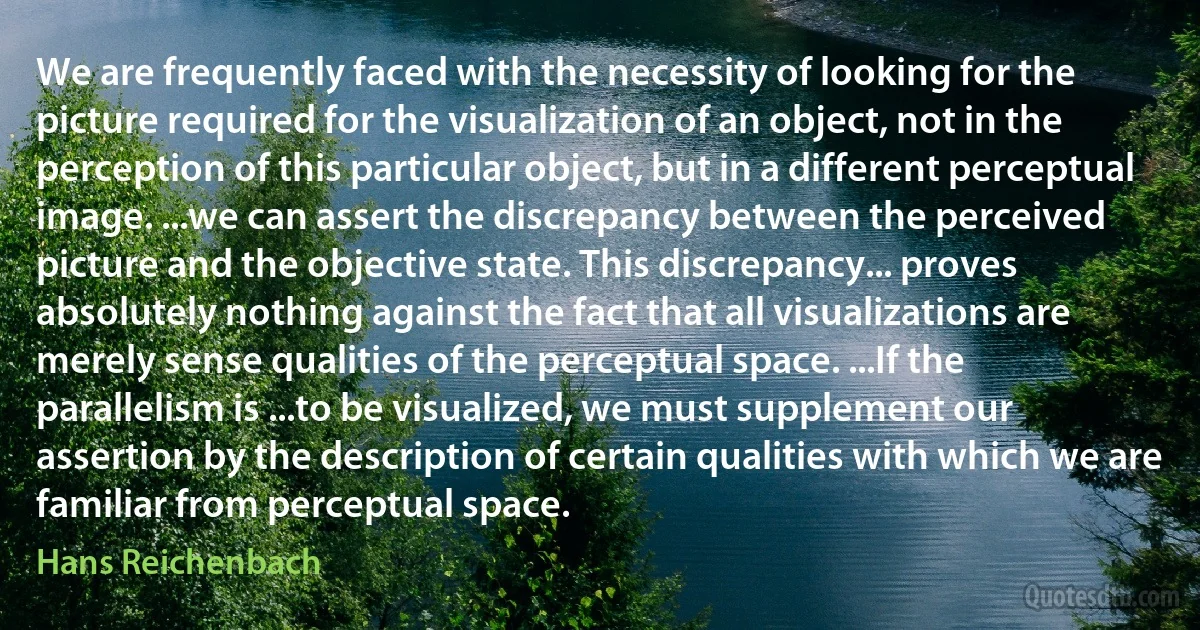
We are frequently faced with the necessity of looking for the picture required for the visualization of an object, not in the perception of this particular object, but in a different perceptual image. ...we can assert the discrepancy between the perceived picture and the objective state. This discrepancy... proves absolutely nothing against the fact that all visualizations are merely sense qualities of the perceptual space. ...If the parallelism is ...to be visualized, we must supplement our assertion by the description of certain qualities with which we are familiar from perceptual space.
Hans ReichenbachRelated topics
certain description different discrepancy looking necessity nothing objective parallelism perception picture sense space state supplement visualizationRelated quotes
Ruburt tuned in to the world view of a man known dead. He was not directly in communication with William James. He was aware, however, of the universe through William James' world view. As you might tune into a program on a television set, Ruburt tuned into the view of reality now held in the mind of William James. Because that view necessarily involved emotions, Ruburt felt some sense of emotional contact -- but only with the validity of the emotions. Each person has such a world view, whether living or dead in your terms, and that "living picture" exists despite time or space. It can be perceived by others.

Robert Butts
The final truth about a phenomenon resides in the mathematical description of it; so long as there is no imperfection in this, our knowledge of the phenomenon is complete. We go beyond the mathematical formula at our own risk; we may find a model or a picture which helps us understand it, but we have no right to expect this, and our failure to find such a model or picture need not indicate that either our reasoning or our knowledge is at fault. The making of models or pictures to explain mathematical formulas and the phenomena they describe is not a step towards, but a step away from reality; it is like making a graven image of a spirit.

James Jeans
The biggest alien invasion picture of the summer of 1996 is Independence Day. But it's not the first. The Arrival, with a significantly lower budget than Fox's July 3 release, has that distinction, and, while this particular film doesn't boast any radical or surprising ideas, it combines numerous familiar plot elements into a suspenseful, entertaining whole. Best of all, perhaps, is the realization that some thought went into writer/director David Twohy's script. This is not a dumb movie; in fact, with its heavy reliance upon real science, it's startlingly credible.

James Berardinelli
In archaic and traditional societies, the surrounding world is conceived as a microcosm. At the limits of this closed world begins the domain of the unknown, of the formless. On this side there is ordered - because of inhabited and organized - space; on the other, outside this familiar space, there is the unknown and dangerous region of the demons, the ghosts, and the dead and foreigners - in a world, chaos or death or night. This image of an inhabited microcosm, surrounded by desert regions as a chaos or a kingdom of the dead, has survived even in highly evolved civilizations such as those of China, Mesopotamia and Egypt.

Mircea Eliade
Throughout human history, as our species has faced the frightening, terrorizing fact that we do not know who we are, or where we are going in this ocean of chaos, it has been the authorities - the political, the religious, the educational authorities - who attempted to comfort us by giving us order, rules, regulations, informing - forming in our minds - their view of reality. To think for yourself you must question authority and learn how to put yourself in a state of vulnerable open-mindedness, chaotic, confused vulnerability to inform yourself.

Timothy Leary
